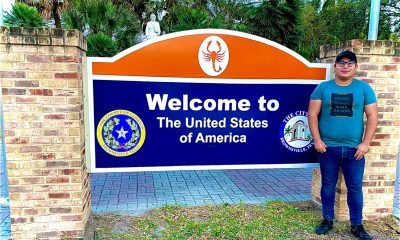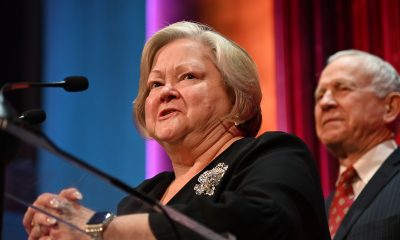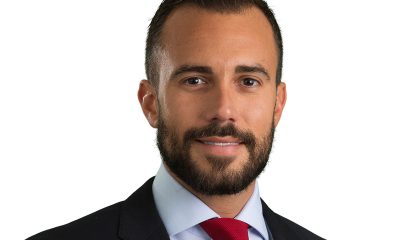homepage news
Court orders return of gay immigrant to U.S. after Christmas nightmare deportation
Mexican national comes home to husband as HIV meds run out
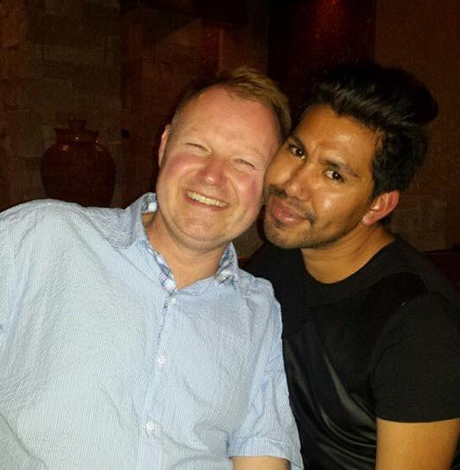
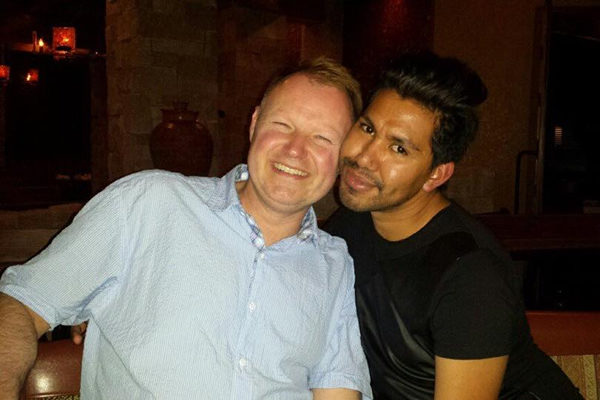
Michael Young with his spouse and gay asylum seeker Carlos Bringas-Rodriguez (Photo courtesy of Immigrant Defenders Law Center)
A gay Mexican immigrant who sought asylum in the United States, but was deported over the recent Christmas holiday despite a court order in his favor, was retrieved Tuesday after a nearly one-month ordeal in which the Trump administration ignored rulings on his behalf.
Carlos Bringas-Rodriguez, who’s gay and HIV positive, is an asylum seeker from Mexico, who was deported Dec. 22 at 3 a.m. and literally dumped at the border with a limited supply of his HIV medications.
U.S. Immigration & Customs Enforcement deported Bringas-Rodriguez even though the U.S. Ninth Circuit Court of Appeals in March determined the persecution he faced in Mexico because of his sexual orientation made him eligible for asylum in the United States.
The Department of Homeland Security removed Bringas-Rodriguez on the basis that he missed a court appearance for asylum — an appearance for which he never received notification — taking him away from his spouse in Kansas City, Michael Young, a U.S. citizen. The couple cares for Bringas-Rodriguez’s 12-year-old cousin as a daughter.
The U.S. government only agreed to allow Bringas-Rodriguez, who also goes by Patricio Iron-Rodriguez, to return to the United States after a subsequent order from the Ninth Circuit on Thursday instructing DHS “to return petitioner to the United States through the Port of Entry at San Ysidro, California, no later than January 16, 2018.”
Bringas-Rodriguez said in a statement to the Blade prior to his retrieval he was relieved the nightmare of being separated from his family over the holidays would end soon.
“I have mixed emotions right now,” Bringas-Rodriguez said. “I am still very traumatized and shaken up from being deported and separated from my family. But I am of course relieved that this nightmare will soon be over and cannot wait to be reunited with my husband and our niece who is like my daughter.”
Young, a physician, expressed his frustration in a statement that his spouse “was taken away from me three days before Christmas, in the dead of night without my knowledge.”
“My husband has been fighting his case for over six years and has cooperated with immigration authorities throughout,” Young said. “As his husband, I am suffering because I do not know when we will be reunited; as a physician, I am terrified that his unlawful deportation will have irreparable consequences to his health. I am just relieved that the Ninth Circuit recognized the wrong done here and has ordered the government to return my husband to me.”
Representing Bringas-Rodriguez is Munmeeth Soni, co-legal director for the Los Angeles-based Immigrant Defenders Law Center, who confirmed he was paroled Tuesday and said his treatment was “not just cruel, but inhumane and outrageous.”
Bringas-Rodriguez first came to the United States in 2010 after suffering persecution in Mexico over his sexual orientation and has been fighting his asylum case ever since. In his hometown of Veracruz, Bringas-Rodriguez was repeatedly raped and sexually abused by his relatives and neighbor.
If Bringas-Rodriguez were forced to remain in Mexico, Soni said he’d face the same anti-gay persecution he endured years ago, only worse.
“There’s even more of a likelihood that it would be at the hand of strangers,” Soni said. “It could be at the hands of the police, or the military, and I think…because of his HIV condition, he definitely faces significant risk of being killed.”
Even without his recent deportation to Mexico, Bringas-Rodriguez’s case for asylum has been a trial. Bringas-Rodriguez first applied for asylum when he initially came to the United States when immigration officials detained him.
The San Diego immigration court where he first made his case denied him asylum because he couldn’t show the Mexican government would have been unwilling or unable to protect him. Part of the reason the case was denied was because of a Ninth Circuit precedent in the 2011 ruling of Castro-Martinez v. Holder against a gay, HIV-positive asylum seeker from Mexico.
On appeals to the Board of Immigrations Appeals, Bringas-Rodriguez again lost his case. When he tested positive for HIV, Bringas-Rodriguez sought a second chance before the board on the basis he was now in a higher category of persecution, but the outcome was no different. (The HIV infection happened not in Mexico, but the United States. He tested positive for the first time at age 23.)
In 2013, Bringas-Rodriguez took another chance before the Ninth Circuit. Up until that time, Bringas-Rodriguez was representing himself, but now was appointed pro bono counsel at the University of California, Irvine. That was when Soni, an adjunct professor at the school, became involved in the case.
The initial decision from the three-judge panel at the Ninth Circuit was against Bringas-Rodriguez on the basis of the 2011 decision. But when the full court agreed to rehear the case, the outcome overturned precedent and was in his favor, remanding the case to immigration court for reconsideration.
“We granted rehearing en banc and now hold that the evidence Bringas adduced before the agency — credible written and oral testimony that reporting was futile and potentially dangerous, that other young gay men had reported their abuse to the Mexican police to no avail, and country reports and news articles documenting official and private persecution of individuals on account of their sexual orientation — satisfies our longstanding evidentiary standards for establishing past persecution and compels the conclusion that Bringas suffered past persecution that the Mexican government was unable or unwilling to control,” the court determined.
Soni said the decision was “beyond positive” because it didn’t just favor Bringas-Rodriguez, but has far-reaching implications.
“It really has been an extraordinary decision for anybody, any person who’s experienced anything that Bringas has experienced,” Soni said.
In summer 2014, Bringas-Rodriguez had moved from San Diego to Kansas City to be with his now husband Young. Prior to that, he had been put on a rigorous supervised system similar to prison probation where DHS monitors his movement and must be informed if he ever leaves the. Soni said Bringas-Rodriguez fastidiously kept up with the requirements.
But his asylum process technically wasn’t over because the immigration court had ruled as a result of the Ninth Circuit order. The U.S. government was given another chance to present evidence against his case, but in the event that didn’t happen, Bringas-Rodriguez would be allowed to stay.
Bringas-Rodriguez checked in with ICE in June and was told the next time he’d need to do so was Dec. 20. But in the meantime, unbeknownst to him, his case was scheduled for a new hearing on Aug. 20 in immigration court in San Diego. DHS showed up for the hearing, but Bringas-Rodriguez didn’t.
As a result, the immigration court issued a deportation order against Bringas-Rodriguez on the basis that his failure to appear demonstrates he’s abandoned his asylum application.
The immigration court is required to send a notice to the person’s address to notify them to appear. Although Soni said they supposedly did that, it may have been sent to a different address in San Diego because Bringas-Rodriguez never received it, nor did he obtain a copy of the deportation order. There’s no certification of service for either document, Soni said.
There’s some dispute as to whether any notice went out. In subsequent communications, Soni said ICE confirmed with the law firm there’s no evidence Bringas-Rodriguez was properly served even at the wrong address in San Diego.
The U.S. government, Soni said, never bothered to inform the immigration court at the hearing DHS is aware of Bringas-Rodriguez’s location and that he wasn’t trying to abscond after putting seven years into his asylum case. DHS also knew the immigration court didn’t send the notice to the right address, but didn’t bring that up, Soni said.
Bringas-Rodriguez’s absence from the hearing about which he was unaware had major consequences when he showed up for his next check-in on Dec. 20.
“He’s immediately detained, and they tell him he’s getting deported,” Soni said. “He has no idea what they’re talking about, and they’re like, ‘Oh yeah, you missed your court hearing, and so obviously you’re getting deported because you didn’t show up.'”
Bringas-Rodriguez called his husband, who in turn called Soni, who’s able to piece together what happened and was able to obtain new local counsel, Rekha Sharma-Crawford of the Sharma-Crawford law firm in Kansas City.
Finalizing the motion to reopen his case, Sharma-Crawford law firm sent the document on Dec. 22. But it’s too late for the holiday season. The San Diego immigration court, without notification to the public, decides to close at 1 p.m. and so the courier couldn’t file the motion at the time. The motion isn’t filed until after Christmas on Dec. 26.
Despite the initial notification at the ICE office, deportation proceedings against Bringas-Rodriguez were underway while he was in detention. He was shackled and taken by plane to Mexico. Officials left him little more than his cell phone and the limited supply of HIV meds given to him by his spouse.
“He was getting deported as were we trying to file this motion to reopen,” Soni said. “By the time we had filed, he had been physically removed from the country.”
That deportation process wasn’t known to either Bringas-Rodriguez’s attorneys or his husband. Soni said on Dec. 22 she received a phone call from Young, who told her he had just heard from Bringas-Rodriguez in Mexico and wouldn’t let him call anyone before that happened.
Soni said Bringas-Rodriguez was stranded in Mexico with a couple weeks supply of his HIV medication that he obtained from his spouse while in immigration detention.
“Our client from there went to this shelter that night, stayed at that shelter until his husband could buy him a ticket to move on there because he was in a border town, and border towns are really dangerous,” Soni said.
The first destination for Bringas-Rodriguez was Veracruz because his grandmother lives there, but that was the place he suffered abuse for being gay and he didn’t want to stay. He left for Oaxaca City, another town that’s a tourist destination where he could be relatively safe, then left for Tijuana.
Soni said attorneys tried to work with DHS officials in San Diego, but after a week of radio silence, decided to take the issue back up with the Ninth Circuit with a writ of mandamus on the basis the lower court had totally ignored the judge’s order.
“In Mexico, petitioner is currently terrified and holed-up in a hotel and quickly running out of his HIV medications; he has no way to get these medications when they run out in the next 9 days,” the writ says. “Since petitioner was not allowed to contact anyone immediately prior to his removal and DHS calculatingly kept that information from his attorneys and his family, no one was able to make medical arrangements for petitioner.”
The Ninth Circuit allowed 24 hours for a response from the U.S. government, which — for the first time — started negotiating with the attorneys and asked to drop the writ because the San Diego immigration court had rescinded its order on the same day.
“We felt very strongly that we weren’t going to give them the benefit of the doubt because, up until this point, they had not been acting with us in good faith, and just also given the fact that our client’s life was on the line,” Soni said. “I’m glad we did that because ultimately, I think, we’ve gotten a faster resolution through the Ninth Circuit.”
The response to the writ of mandamus filed by Acting Assistant Attorney General for Civil Division Chad Readler made no reference to Bringas-Rodriguez’s dwindling supply of HIV meds even though that was the basis of argument presented to the Ninth Circuit.
“[A]ny alleged error in the Immigration Judge’s in absentia ruling has now been remedied, as the immigration judge has reopened proceedings and Mr. Bringas-Rodriguez will be provided further hearings on the merits of his claim,” the brief says. “As Mr. Bringas-Rodriguez has an available remedy, mandamus is not warranted.”
Soni said the U.S. government attorney didn’t think the dwindling supply of HIV meds was a big deal and said the family could ship them to him to Mexico — demonstrating a lack of knowledge of laws against sending medication outside the United States as well as difficulty of obtaining HIV treatment across the border.
“That’s exactly what all our arguments and our briefs were about and it’s as though this man didn’t even bother reading it,” Soni said.
Within hours of the government filing its brief at 4 p.m., the Ninth Circuit issued the order demanding DHS reclaim Bringas-Rodriguez, give him his medications, and take him back to Kansas City.
“We’re very, very, very lucky, but I also think that the court here was not pleased at all with how the government has treated Patricio, and how they just sort of ignored the order in the first place,” Soni said.
The order came in the nick of time. Soni said Bringas-Rodriguez took his last HIV pill two days before he was ultimately retrieved.
Lauren Mack, an ICE spokesperson, responded with a statement on the facts of the case in response to the Washington Blade’s request for a comment on why ICE allowed the deportation.
“According to DHS database records, officers with ICE’s Enforcement & Removal Operations San Diego removed Carlos Alberto Bringas-Rodriguez to Mexico Dec. 22,” Mack said. “An immigration judge with the Department of Justice’s Executive Office for Immigration Review issued Mr. Bringas-Rodriguez a final order of removal Aug. 22, which served as the basis for his removal. A motion to reopen his case was filed Dec. 26, and proceedings in his case are ongoing.”
The Department of Justice didn’t respond to the Blade’s request for comment.
As a result of the U.S. Supreme Court’s 2013 decision against the anti-gay Defense of Marriage Act, U.S. citizens in same-sex marriages, like Americans in opposite-sex marriages, can sponsor their immigrant spouses for Green Cards with an I-130 application. Soni, however, said Bringas-Rodriguez wasn’t eligible because he’s subject to the permanent bar and would have to wait 10 years outside of the country before that would be an option.
Soni said the next steps in the case aren’t settled. Although Soni said suing for damages is a “good conversation that we might have,” the main task at hand as of Tuesday was retrieving Bringas-Rodriguez from Mexico.
But was the mess of immigration laws in the United States to blame for the nightmare scenario, or something else? Soni said the Trump administration’s anti-immigration policies bear the responsibility for the scenario.
“I’d like to think that they wouldn’t have done that under the prior administration, but that under this administration, given the tenor of both Trump as well as [U.S. Attorney General Jeff] Sessions against immigrants, irrespective of whether they’re here lawfully or not, or who they are, or what they’ve done for the communities, the bottom line is to deport them,” Soni said.
Deportations are rising under the Trump administration. According to the Associated Press, nearly 54,000 immigrants were deported from the interior last year between Jan. 22 and Sept. 9 — a 34 percent increase over the same period in 2016.
Soni added, “there’s truth to the fact” that low-level immigration officials feel empowered deport immigrants with Trump at the helm.
“To a certain degree, DHS and DOJ thought they could get away with this, that they would not be held to task,” Soni said.
homepage news
Honoring the legacy of New Orleans’ 1973 UpStairs Lounge fire
Why the arson attack that killed 32 gay men still resonates 50 years later

On June 23 of last year, I held the microphone as a gay man in the New Orleans City Council Chamber and related a lost piece of queer history to the seven council members. I told this story to disabuse all New Orleanians of the notion that silence and accommodation, in the face of institutional and official failures, are a path to healing.
The story I related to them began on a typical Sunday night at a second-story bar on the fringe of New Orleans’ French Quarter in 1973, where working-class men would gather around a white baby grand piano and belt out the lyrics to a song that was the anthem of their hidden community, “United We Stand” by the Brotherhood of Man.
“United we stand,” the men would sing together, “divided we fall” — the words epitomizing the ethos of their beloved UpStairs Lounge bar, an egalitarian free space that served as a forerunner to today’s queer safe havens.
Around that piano in the 1970s Deep South, gays and lesbians, white and Black queens, Christians and non-Christians, and even early gender minorities could cast aside the racism, sexism, and homophobia of the times to find acceptance and companionship for a moment.
For regulars, the UpStairs Lounge was a miracle, a small pocket of acceptance in a broader world where their very identities were illegal.
On the Sunday night of June 24, 1973, their voices were silenced in a murderous act of arson that claimed 32 lives and still stands as the deadliest fire in New Orleans history — and the worst mass killing of gays in 20th century America.
As 13 fire companies struggled to douse the inferno, police refused to question the chief suspect, even though gay witnesses identified and brought the soot-covered man to officers idly standing by. This suspect, an internally conflicted gay-for-pay sex worker named Rodger Dale Nunez, had been ejected from the UpStairs Lounge screaming the word “burn” minutes before, but New Orleans police rebuffed the testimony of fire survivors on the street and allowed Nunez to disappear.
As the fire raged, police denigrated the deceased to reporters on the street: “Some thieves hung out there, and you know this was a queer bar.”
For days afterward, the carnage met with official silence. With no local gay political leaders willing to step forward, national Gay Liberation-era figures like Rev. Troy Perry of the Metropolitan Community Church flew in to “help our bereaved brothers and sisters” — and shatter officialdom’s code of silence.
Perry broke local taboos by holding a press conference as an openly gay man. “It’s high time that you people, in New Orleans, Louisiana, got the message and joined the rest of the Union,” Perry said.
Two days later, on June 26, 1973, as families hesitated to step forward to identify their kin in the morgue, UpStairs Lounge owner Phil Esteve stood in his badly charred bar, the air still foul with death. He rebuffed attempts by Perry to turn the fire into a call for visibility and progress for homosexuals.
“This fire had very little to do with the gay movement or with anything gay,” Esteve told a reporter from The Philadelphia Inquirer. “I do not want my bar or this tragedy to be used to further any of their causes.”
Conspicuously, no photos of Esteve appeared in coverage of the UpStairs Lounge fire or its aftermath — and the bar owner also remained silent as he witnessed police looting the ashes of his business.
“Phil said the cash register, juke box, cigarette machine and some wallets had money removed,” recounted Esteve’s friend Bob McAnear, a former U.S. Customs officer. “Phil wouldn’t report it because, if he did, police would never allow him to operate a bar in New Orleans again.”
The next day, gay bar owners, incensed at declining gay bar traffic amid an atmosphere of anxiety, confronted Perry at a clandestine meeting. “How dare you hold your damn news conferences!” one business owner shouted.
Ignoring calls for gay self-censorship, Perry held a 250-person memorial for the fire victims the following Sunday, July 1, culminating in mourners defiantly marching out the front door of a French Quarter church into waiting news cameras. “Reverend Troy Perry awoke several sleeping giants, me being one of them,” recalled Charlene Schneider, a lesbian activist who walked out of that front door with Perry.

Esteve doubted the UpStairs Lounge story’s capacity to rouse gay political fervor. As the coroner buried four of his former patrons anonymously on the edge of town, Esteve quietly collected at least $25,000 in fire insurance proceeds. Less than a year later, he used the money to open another gay bar called the Post Office, where patrons of the UpStairs Lounge — some with visible burn scars — gathered but were discouraged from singing “United We Stand.”
New Orleans cops neglected to question the chief arson suspect and closed the investigation without answers in late August 1973. Gay elites in the city’s power structure began gaslighting the mourners who marched with Perry into the news cameras, casting suspicion on their memories and re-characterizing their moment of liberation as a stunt.
When a local gay journalist asked in April 1977, “Where are the gay activists in New Orleans?,” Esteve responded that there were none, because none were needed. “We don’t feel we’re discriminated against,” Esteve said. “New Orleans gays are different from gays anywhere else… Perhaps there is some correlation between the amount of gay activism in other cities and the degree of police harassment.”

An attitude of nihilism and disavowal descended upon the memory of the UpStairs Lounge victims, goaded by Esteve and fellow gay entrepreneurs who earned their keep via gay patrons drowning their sorrows each night instead of protesting the injustices that kept them drinking.
Into the 1980s, the story of the UpStairs Lounge all but vanished from conversation — with the exception of a few sanctuaries for gay political debate such as the local lesbian bar Charlene’s, run by the activist Charlene Schneider.
By 1988, the 15th anniversary of the fire, the UpStairs Lounge narrative comprised little more than a call for better fire codes and indoor sprinklers. UpStairs Lounge survivor Stewart Butler summed it up: “A tragedy that, as far as I know, no good came of.”
Finally, in 1991, at Stewart Butler and Charlene Schneider’s nudging, the UpStairs Lounge story became aligned with the crusade of liberated gays and lesbians seeking equal rights in Louisiana. The halls of power responded with intermittent progress. The New Orleans City Council, horrified by the story but not yet ready to take its look in the mirror, enacted an anti-discrimination ordinance protecting gays and lesbians in housing, employment, and public accommodations that Dec. 12 — more than 18 years after the fire.
“I believe the fire was the catalyst for the anger to bring us all to the table,” Schneider told The Times-Picayune, a tacit rebuke to Esteve’s strategy of silent accommodation. Even Esteve seemed to change his stance with time, granting a full interview with the first UpStairs Lounge scholar Johnny Townsend sometime around 1989.
Most of the figures in this historic tale are now deceased. What’s left is an enduring story that refused to go gently. The story now echoes around the world — a musical about the UpStairs Lounge fire recently played in Tokyo, translating the gay underworld of the 1973 French Quarter for Japanese audiences.
When I finished my presentation to the City Council last June, I looked up to see the seven council members in tears. Unanimously, they approved a resolution acknowledging the historic failures of city leaders in the wake of the UpStairs Lounge fire.
Council members personally apologized to UpStairs Lounge families and survivors seated in the chamber in a symbolic act that, though it could not bring back those who died, still mattered greatly to those whose pain had been denied, leaving them to grieve alone. At long last, official silence and indifference gave way to heartfelt words of healing.
The way Americans remember the past is an active, ongoing process. Our collective memory is malleable, but it matters because it speaks volumes about our maturity as a people, how we acknowledge the past’s influence in our lives, and how it shapes the examples we set for our youth. Do we grapple with difficult truths, or do we duck accountability by defaulting to nostalgia and bluster? Or worse, do we simply ignore the past until it fades into a black hole of ignorance and indifference?
I believe that a factual retelling of the UpStairs Lounge tragedy — and how, 50 years onward, it became known internationally — resonates beyond our current divides. It reminds queer and non-queer Americans that ignoring the past holds back the present, and that silence is no cure for what ails a participatory nation.
Silence isolates. Silence gaslights and shrouds. It preserves the power structures that scapegoat the disempowered.
Solidarity, on the other hand, unites. Solidarity illuminates a path forward together. Above all, solidarity transforms the downtrodden into a resounding chorus of citizens — in the spirit of voices who once gathered ‘round a white baby grand piano and sang, joyfully and loudly, “United We Stand.”

Robert W. Fieseler is a New Orleans-based journalist and the author of “Tinderbox: the Untold Story of the Up Stairs Lounge Fire and the Rise of Gay Liberation.”
homepage news
New Supreme Court term includes critical LGBTQ case with ‘terrifying’ consequences
Business owner seeks to decline services for same-sex weddings

The U.S. Supreme Court, after a decision overturning Roe v. Wade that still leaves many reeling, is starting a new term with justices slated to revisit the issue of LGBTQ rights.
In 303 Creative v. Elenis, the court will return to the issue of whether or not providers of custom-made goods can refuse service to LGBTQ customers on First Amendment grounds. In this case, the business owner is Lorie Smith, a website designer in Colorado who wants to opt out of providing her graphic design services for same-sex weddings despite the civil rights law in her state.
Jennifer Pizer, acting chief legal officer of Lambda Legal, said in an interview with the Blade, “it’s not too much to say an immeasurably huge amount is at stake” for LGBTQ people depending on the outcome of the case.
“This contrived idea that making custom goods, or offering a custom service, somehow tacitly conveys an endorsement of the person — if that were to be accepted, that would be a profound change in the law,” Pizer said. “And the stakes are very high because there are no practical, obvious, principled ways to limit that kind of an exception, and if the law isn’t clear in this regard, then the people who are at risk of experiencing discrimination have no security, no effective protection by having a non-discrimination laws, because at any moment, as one makes their way through the commercial marketplace, you don’t know whether a particular business person is going to refuse to serve you.”
The upcoming arguments and decision in the 303 Creative case mark a return to LGBTQ rights for the Supreme Court, which had no lawsuit to directly address the issue in its previous term, although many argued the Dobbs decision put LGBTQ rights in peril and threatened access to abortion for LGBTQ people.
And yet, the 303 Creative case is similar to other cases the Supreme Court has previously heard on the providers of services seeking the right to deny services based on First Amendment grounds, such as Masterpiece Cakeshop and Fulton v. City of Philadelphia. In both of those cases, however, the court issued narrow rulings on the facts of litigation, declining to issue sweeping rulings either upholding non-discrimination principles or First Amendment exemptions.
Pizer, who signed one of the friend-of-the-court briefs in opposition to 303 Creative, said the case is “similar in the goals” of the Masterpiece Cakeshop litigation on the basis they both seek exemptions to the same non-discrimination law that governs their business, the Colorado Anti-Discrimination Act, or CADA, and seek “to further the social and political argument that they should be free to refuse same-sex couples or LGBTQ people in particular.”
“So there’s the legal goal, and it connects to the social and political goals and in that sense, it’s the same as Masterpiece,” Pizer said. “And so there are multiple problems with it again, as a legal matter, but also as a social matter, because as with the religion argument, it flows from the idea that having something to do with us is endorsing us.”
One difference: the Masterpiece Cakeshop litigation stemmed from an act of refusal of service after owner, Jack Phillips, declined to make a custom-made wedding cake for a same-sex couple for their upcoming wedding. No act of discrimination in the past, however, is present in the 303 Creative case. The owner seeks to put on her website a disclaimer she won’t provide services for same-sex weddings, signaling an intent to discriminate against same-sex couples rather than having done so.
As such, expect issues of standing — whether or not either party is personally aggrieved and able bring to a lawsuit — to be hashed out in arguments as well as whether the litigation is ripe for review as justices consider the case. It’s not hard to see U.S. Chief Justice John Roberts, who has sought to lead the court to reach less sweeping decisions (sometimes successfully, and sometimes in the Dobbs case not successfully) to push for a decision along these lines.
Another key difference: The 303 Creative case hinges on the argument of freedom of speech as opposed to the two-fold argument of freedom of speech and freedom of religious exercise in the Masterpiece Cakeshop litigation. Although 303 Creative requested in its petition to the Supreme Court review of both issues of speech and religion, justices elected only to take up the issue of free speech in granting a writ of certiorari (or agreement to take up a case). Justices also declined to accept another question in the petition request of review of the 1990 precedent in Smith v. Employment Division, which concluded states can enforce neutral generally applicable laws on citizens with religious objections without violating the First Amendment.
Representing 303 Creative in the lawsuit is Alliance Defending Freedom, a law firm that has sought to undermine civil rights laws for LGBTQ people with litigation seeking exemptions based on the First Amendment, such as the Masterpiece Cakeshop case.
Kristen Waggoner, president of Alliance Defending Freedom, wrote in a Sept. 12 legal brief signed by her and other attorneys that a decision in favor of 303 Creative boils down to a clear-cut violation of the First Amendment.
“Colorado and the United States still contend that CADA only regulates sales transactions,” the brief says. “But their cases do not apply because they involve non-expressive activities: selling BBQ, firing employees, restricting school attendance, limiting club memberships, and providing room access. Colorado’s own cases agree that the government may not use public-accommodation laws to affect a commercial actor’s speech.”
Pizer, however, pushed back strongly on the idea a decision in favor of 303 Creative would be as focused as Alliance Defending Freedom purports it would be, arguing it could open the door to widespread discrimination against LGBTQ people.
“One way to put it is art tends to be in the eye of the beholder,” Pizer said. “Is something of a craft, or is it art? I feel like I’m channeling Lily Tomlin. Remember ‘soup and art’? We have had an understanding that whether something is beautiful or not is not the determining factor about whether something is protected as artistic expression. There’s a legal test that recognizes if this is speech, whose speech is it, whose message is it? Would anyone who was hearing the speech or seeing the message understand it to be the message of the customer or of the merchants or craftsmen or business person?”
Despite the implications in the case for LGBTQ rights, 303 Creative may have supporters among LGBTQ people who consider themselves proponents of free speech.
One joint friend-of-the-court brief before the Supreme Court, written by Dale Carpenter, a law professor at Southern Methodist University who’s written in favor of LGBTQ rights, and Eugene Volokh, a First Amendment legal scholar at the University of California, Los Angeles, argues the case is an opportunity to affirm the First Amendment applies to goods and services that are uniquely expressive.
“Distinguishing expressive from non-expressive products in some contexts might be hard, but the Tenth Circuit agreed that Smith’s product does not present a hard case,” the brief says. “Yet that court (and Colorado) declined to recognize any exemption for products constituting speech. The Tenth Circuit has effectively recognized a state interest in subjecting the creation of speech itself to antidiscrimination laws.”
Oral arguments in the case aren’t yet set, but may be announced soon. Set to defend the state of Colorado and enforcement of its non-discrimination law in the case is Colorado Solicitor General Eric Reuel Olson. Just this week, the U.S. Supreme Court announced it would grant the request to the U.S. solicitor general to present arguments before the justices on behalf of the Biden administration.
With a 6-3 conservative majority on the court that has recently scrapped the super-precedent guaranteeing the right to abortion, supporters of LGBTQ rights may think the outcome of the case is all but lost, especially amid widespread fears same-sex marriage would be next on the chopping block. After the U.S. Tenth Circuit Court of Appeals ruled against 303 Creative in the lawsuit, the simple action by the Supreme Court to grant review in the lawsuit suggests they are primed to issue a reversal and rule in favor of the company.
Pizer, acknowledging the call to action issued by LGBTQ groups in the aftermath of the Dobbs decision, conceded the current Supreme Court issuing the ruling in this case is “a terrifying prospect,” but cautioned the issue isn’t so much the makeup of the court but whether or not justices will continue down the path of abolishing case law.
“I think the question that we’re facing with respect to all of the cases or at least many of the cases that are in front of the court right now, is whether this court is going to continue on this radical sort of wrecking ball to the edifice of settled law and seemingly a goal of setting up whole new structures of what our basic legal principles are going to be. Are we going to have another term of that?” Pizer said. “And if so, that’s terrifying.”
homepage news
Kelley Robinson, a Black, queer woman, named president of Human Rights Campaign
Progressive activist a veteran of Planned Parenthood Action Fund

Kelley Robinson, a Black, queer woman and veteran of Planned Parenthood Action Fund, is to become the next president of the Human Rights Campaign, the nation’s leading LGBTQ group announced on Tuesday.
Robinson is set to become the ninth president of the Human Rights Campaign after having served as executive director of Planned Parenthood Action Fund and more than 12 years of experience as a leader in the progressive movement. She’ll be the first Black, queer woman to serve in that role.
“I’m honored and ready to lead HRC — and our more than three million member-advocates — as we continue working to achieve equality and liberation for all Lesbian, Gay, Bisexual, Transgender, and Queer people,” Robinson said. “This is a pivotal moment in our movement for equality for LGBTQ+ people. We, particularly our trans and BIPOC communities, are quite literally in the fight for our lives and facing unprecedented threats that seek to destroy us.”
The next Human Rights Campaign president is named as Democrats are performing well in polls in the mid-term elections after the U.S. Supreme Court overturned Roe v. Wade, leaving an opening for the LGBTQ group to play a key role amid fears LGBTQ rights are next on the chopping block.
“The overturning of Roe v. Wade reminds us we are just one Supreme Court decision away from losing fundamental freedoms including the freedom to marry, voting rights, and privacy,” Robinson said. “We are facing a generational opportunity to rise to these challenges and create real, sustainable change. I believe that working together this change is possible right now. This next chapter of the Human Rights Campaign is about getting to freedom and liberation without any exceptions — and today I am making a promise and commitment to carry this work forward.”
The Human Rights Campaign announces its next president after a nearly year-long search process after the board of directors terminated its former president Alphonso David when he was ensnared in the sexual misconduct scandal that led former New York Gov. Andrew Cuomo to resign. David has denied wrongdoing and filed a lawsuit against the LGBTQ group alleging racial discrimination.




